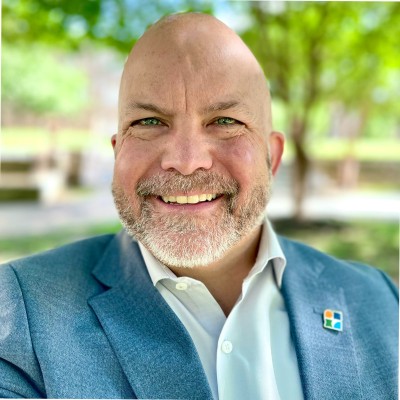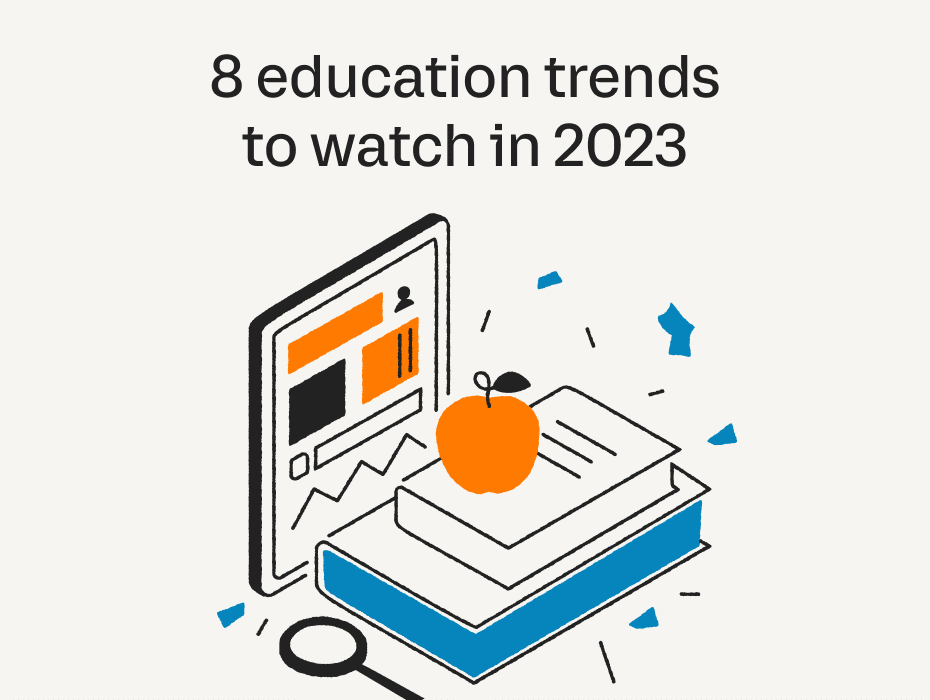We sat down with RingCentral’s Brian Baute to discuss:
- Brian’s unique background in both education and technology
- Why he led the adoption of RingCentral while at Queens University of Charlotte
- A customer’s point of view on RingCentral benefits
- Brian’s transition into a role as an industry principal for RingCentral
- Tips and insights on successful adoption of a communications system in education
👩🏫 💻 📚 As the campus environment changes to become virtual as well as physical, how can colleges and universities offer better methods of engagement? Get our white paper from Aragon Research to find out.

Brian Baute, Industry Principal, RingCentral Education
Few people can speak to the importance of communications technology in education better than Brian Baute. Brian is an industry principal with RingCentral Education, which enables him to blend his background in K-12 and university education with his industry experience in technology.
Here’s a bit more about Brian’s background, along with his perspectives on RingCentral as a customer, and now as an ambassador.
Brian’s education technology path
In college, Brian started as a computer science major with a strong interest in technology. However, he eventually shifted gears and earned a degree in English. After school, his educational career began as a high school English teacher.
Brian’s passion for tech did not go away, however. After a few years of teaching, he transitioned careers and went into web programming and project management.
It is rare when someone finds a job that effectively merges their two primary interests and experiences in a perfect way, but that is what Brian discovered when he took a job in technology with a local university. That job sparked a 20-year run in technology positions of increasing responsibility in colleges and universities—both big and small, both public and private. Over this time, the technology gap between private industry and education widened, with budget issues and a lack of prioritization for the evolving importance of educational technology both contributing to that widening gap.
When RingCentral came “calling”
In 2019, Brian was chief information officer (CIO) at Queens University of Charlotte and taught as an adjunct instructor in the business school. The university had a legacy on-premises phone system, and Brian led a project team tasked with evaluating options. In the course of their research, Brian and the team believed that a new phone system did not fully address the more holistic digital communications infrastructure needed for modern education, so the team shifted its focus to comprehensive, cloud-based, cross-channel communications systems.
RingCentral was one of the platforms evaluated, and the team selected it as the right cloud communications solution, with a successful project implementation taking place from mid-2019 to early 2020. The fortuitous timing of having the new platform in place enabled the university to deliver effective virtual learning and student services more quickly than most of its peers when the pandemic caused all university operations to move online.

A customer’s perspective and an advocate’s passion
Brian found that it was the true cloud architecture and full suite of services that really attracted him to RingCentral as a customer. Many schools are challenged to do more with less, and RingCentral’s phone, messaging, and video with industry-leading reliability, security, and analytics proved to be the best solution for their needs.
RingCentral is unique in its “active-active calling” data center approach, with each call simultaneously connected through two data centers, enabling RingCentral’s 99.999% uptime SLA and 15 straight quarters averaging less than one second of downtime per day.
The importance of reliability
Brian gave several real examples of the importance of this reliability for colleges and universities. Here are just a couple:
- If a virtual class disconnects or goes offline, even momentarily, the rest of the class session may need to be canceled as well since many students won’t try to reconnect after only a few minutes. With RingCentral, you stay connected.
- Customer-facing areas like Admissions, Financial Aid, Student Success, and Advancement rely on making and receiving calls with prospective students, current students, families, alumni, and donors to be effective. With the importance of these areas to the university’s mission and revenue, they can’t afford to lose these connections and opportunities.
The move to RingCentral
Brian believed so much in the importance of digital communications in education and the capabilities of RingCentral that his next move was a shift from customer to employee. He now leads the way in bringing RingCentral’s cloud-based, cross-channel communications system into schools, districts, colleges, and universities around the world.
Based on his experience as an educator and technology expert, Brian is uniquely equipped to speak about RingCentral benefits to potential clients. He also offers great insight into optimized adoption and onboarding.
Top 3 tips for successful adoption
Here is just a sampling of his top tips for school administrators implementing communications system changes:
1) Phase the project
At Queens, Brian’s IT team adopted RingCentral within their department first to test it and learn how to best integrate it into university operations. Then, the system was phased in department by department, gathering internal advocates along the way.
2) Recognize change resistance
Some areas of campus can be culturally resistant to change. Brian’s group identified early adopters in departments with long-term employees, garnering support and referrals from early adopters. Getting this early buy-in was helpful in accelerating adoption in the rest of the college community.
3) Invite input on integration
Rather than forcing a uniform process on all departments, the project was customized to the unique needs and interests of each department. Departments were encouraged to collaborate and make choices together on implementation, such as whether to use a physical desk phone or switch to a different choice like laptop softphone with headsets or going fully mobile with the RingCentral smartphone app.
RingCentral for the win!
There is perhaps no greater “ringing” endorsement of a product than when a happy customer decides to change jobs to represent that product to others with similar needs. That is exactly what Brian did, and few people have better experience to speak to the significance of a unified communications system in modern education than he does.
Brian shared one other compelling anecdote that further illustrates why digital communications platforms are so essential in education right now. He related the real-life story of an MBA student who was attending class via RingCentral one day and, during a breakout small group discussion, told his group he’d be right back. When the student returned, he informed his group that he’d had to step away to run his final race of the conference track and field meet, which he won. It turns out this student had initially joined class from his residence hall room, then continued class on a bus to the meet, then left to go run (and win) his race, and then returned to continue working with his group while the track meet continued.
This true story speaks to the compelling benefit of reliable connectivity that RingCentral offers, regardless of device (desktop, laptop, smartphone). If your school is looking to enhance and broaden its communication capabilities as part of a digital transformation initiative, look no further than RingCentral. See how RingCentral works and begin your digital transformation today!
Originally published Jul 13, 2022





